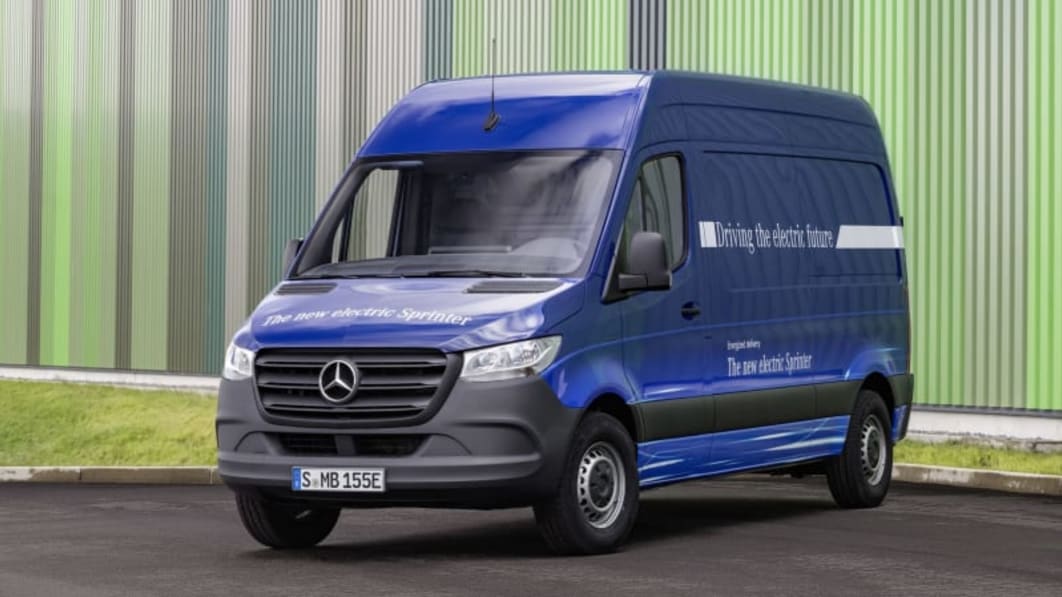While mainstream EVs like the
Tesla Model 3,
Nissan Leaf and
Chevy Bolt EV may get most of the attention,
electric vehicles have just as much potential to impact the
commercial vehicle segment. That's why companies like
Tesla and Workhorse are
developing products tailored for
hauling cargo. Next year, we'll see the new
Mercedes-Benz eSprinter, the electric version of the German automaker's
latest cargo van.
We finally have the details on the new e-van. Mercedes will offer two batteries: a 41 kWh battery that delivers 71.5 miles of range and a 55 kWh battery that offers 93.2 miles of range. While those may fall far short of the current crop of EVs, the eSprinter is focused on short-range driving for all-day deliveries for companies like UPS and FedEx rather than long-haul driving. The 41 kWh battery can be fully charged in six hours, while the larger battery takes a full eight hours to charge. Using a DC fast charger, however, both batteries can be charged to 80 percent capacity in just 45 minutes.
As with any commercial vehicle, payload is hugely important. The overall gross-vehicle weight is 7,716 pounds. The 55 kWh model can haul 1,984 pounds. The smaller 41 kWh model can actually haul 2,293 pounds of cargo. The 309-pound difference is due to the 41 kWh battery's lighter weight.
On paper, the power numbers seem unimpressive — 113 horsepower and 221 pound-feet of torque. It's really beside the point, as eSprinter drivers aren't too concerned about 0-60 mph runs. In fact, the van is limited to just 50 mph in city driving in order to conserve range. Outside of the city, the eSprinter can hit 75 mph before topping out.
Mercedes-Benz and Daimler have plans to electrify the entire van lineup. The eSprinter will be the second model released, following the eVito passenger van. The third model will be the smaller eCitan.
Related Video:
We finally have the details on the new e-van. Mercedes will offer two batteries: a 41 kWh battery that delivers 71.5 miles of range and a 55 kWh battery that offers 93.2 miles of range. While those may fall far short of the current crop of EVs, the eSprinter is focused on short-range driving for all-day deliveries for companies like UPS and FedEx rather than long-haul driving. The 41 kWh battery can be fully charged in six hours, while the larger battery takes a full eight hours to charge. Using a DC fast charger, however, both batteries can be charged to 80 percent capacity in just 45 minutes.
As with any commercial vehicle, payload is hugely important. The overall gross-vehicle weight is 7,716 pounds. The 55 kWh model can haul 1,984 pounds. The smaller 41 kWh model can actually haul 2,293 pounds of cargo. The 309-pound difference is due to the 41 kWh battery's lighter weight.
On paper, the power numbers seem unimpressive — 113 horsepower and 221 pound-feet of torque. It's really beside the point, as eSprinter drivers aren't too concerned about 0-60 mph runs. In fact, the van is limited to just 50 mph in city driving in order to conserve range. Outside of the city, the eSprinter can hit 75 mph before topping out.
Mercedes-Benz and Daimler have plans to electrify the entire van lineup. The eSprinter will be the second model released, following the eVito passenger van. The third model will be the smaller eCitan.
Related Video:

